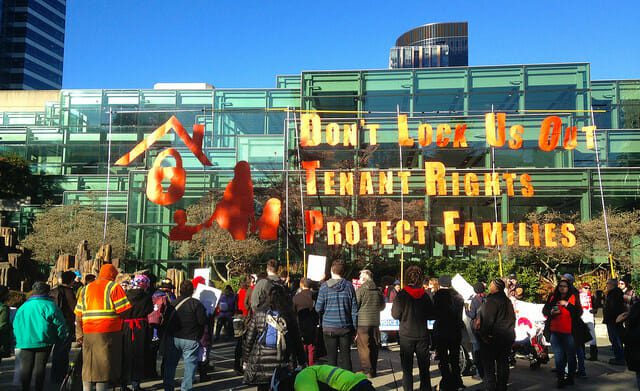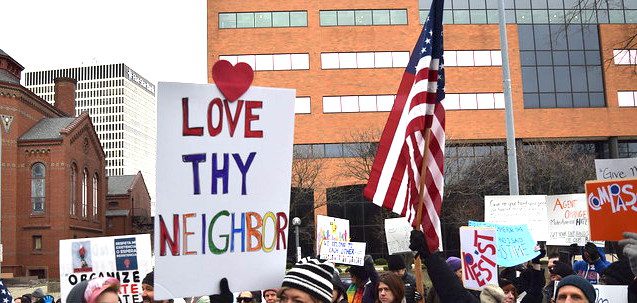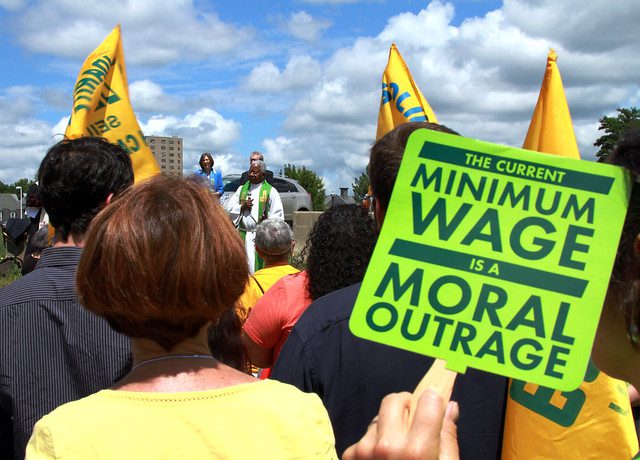
Photo by Backbone Campaign via flickr, 2017, CC BY 2.0
Quote of The Week: “ . . . landlords evict tenants because they have power, not because the law supports them.” —The Right to Counsel Coalition of NYC
San Francisco joined New York City and became the second city in the country to guarantee renters a right to counsel when facing an eviction lawsuit in court. The city’s Proposition F won with 56 percent of the vote last week, and had the support of all recent mayoral candidates. Other cities have established legal aid funds for low-income tenants, but no others have yet guaranteed their representation. Tenants advocates hope this will be yet another push in the national movement for renters rights.
Not wanting to be a step behind San Francisco, which doesn’t have an income cap for its right to counsel program, New York City council members will soon introduce new bills that would expand its own landmark program. “It’s a response to changing economics of the city, where the cost of housing and the cost of living continues to rise, and we are totally out of whack with the federal poverty level,” Councilman Mark Levine said.
San Francisco made more history this week as it named London Breed mayor-elect—she becomes the first African-American woman to be elected mayor of the city. Breed is a native of San Francisco and grew up in the city’s public housing. She was a supporter of the failed SB 827 “YIMBY” measure, and during her campaign, she spoke in favor of loosening restrictions on development in hopes that it will bring down housing costs.
More Carson whiplash. After much fanfare about HUD-subsidized rent increases and how they were going to make the system more fair and encourage self sufficiency, HUD Secretary Ben Carson has dropped them, claiming they were only necessary because HUD was looking at deep budget cuts (from your president, Mr. Carson) which Congress did not pass. This is good, if not strange, news, but let’s not let this be preparation for getting us to accept smaller rent hikes without protest because they look “reasonable” in comparison.
We’ve been flooded with the data that show that growing up in an area where you experience fewer traumatic events and have access to more opportunities is better for you. So far, so good. But in terms of wealth and opportunities, it might be more of a curve than a straight line. Apparently researchers have found that the pressure and stress of being in the most high “achieving” school districts leads to higher levels of depression, anxiety, and drug abuse, similar to those in low-income areas.
The ACLU is squaring off against Faribault, Minnesota, over its “Crime-Free Housing Program,” which according to HousingWire, allows the eviction of an entire household if one member is “. . . thought to be engaging in criminal behavior. The police can order these evictions without arrest or prosecution, and [evictions] can stand even if the person in question is found not guilty.” The ACLU argues that the ordinance is targeted at the town’s modest Somali population because they are more likely to be renters, and because the ordinance also comes with an occupancy standard and the Somali residents typically have larger families. The town is denying the disparate impact, but even if they are right (we aren’t convinced), they haven’t addressed the question of how punishing the innocent and worsening the country’s eviction crisis is going to end up being a net benefit to public safety.
Last month, the second phase of a national model for co-locating housing and health care was completed. Brooklyn’s CAMBA Gardens is a partnership between public Kings County Hospital, nonprofit community developer Camba Housing Ventures, and social service providers and community stakeholders that will provide housing and supportive services on the hospital’s campus. Of the development’s 293 units, 110 are set aside for individuals and families that make no more than 60 percent of AMI, and the remainder for formerly homeless families and individuals. Throughout the process, over 150 local residents were employed, and 38 permanent jobs were created.
States are now allowed to purge voters from the voting rolls if they didn’t cast a ballot in previous elections, thanks to a decision by the Supreme Court this week. It’s an upsetting decision and a major setback for voting rights, and there’s no doubt in our minds that the move will disproportionately affect people of color and low-income voters. We hope more states adopt Election Day registration programs to allow eligible voters to vote if they have unknowingly been removed the rolls.
As if we needed more examples to show how little the new Consumer Financial Protection Bureau cares about the consumer (here’s another one; and just one more here). Do you think the situation will get any better once Mick Mulvaney is gone and a permanent director is installed? We don’t think so either.





Comments